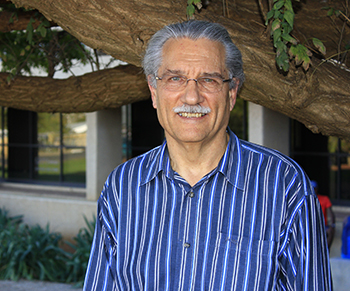Latest News Archive
Please select Category, Year, and then Month to display items
02 January 2025
|
Story Gerda-Marie van Rooyen
|
Photo Supplied
 Leading the research in South Africa is Prof Linus Franke from the Department of Soil, Crop and Climate Sciences.
Leading the research in South Africa is Prof Linus Franke from the Department of Soil, Crop and Climate Sciences.
Scientists are actively pursuing the successful breeding of diploid hybrid potatoes from inbred lines. This is expected to revolutionise potato breeding as it holds the key to rapid genetic progress. It will introduce new varieties for commercialisation through seed. Currently, existing potato variants have a gene that renders self-pollinated seeds infertile.
Prof Linus Franke, an academic in the Department of Soil, Crop and Climate Sciences at the UFS, is leading the research in South Africa. “This technology allows the production of genetically uniform potato seed that is easy to transport and largely disease-free.” He says this differs from conventional breeding whereby only vegetative propagation is possible due to tetraploid varieties in potatoes. It also risks carrying pests and diseases from one generation to the next – leading to the accumulation of pests and diseases with each round of multiplication.
Seed innovation
Prof Franke explains that Solynta BV, a seed company based in the Netherlands that produces potato varieties that can be grown from seed, has included South Africa in their research efforts because it is one of Africa’s largest producers and exporters. Through his academic relationship with Wageningen University and Research, a Dutch institution renowned for its agricultural endeavours and food production, the UFS became involved in researching hybrid potatoes grown from seed.
Diploid seeds containing two sets of chromosomes allow easier gene manipulation to increase predictability and speedier genetic progress. The breeding approach enables the incorporation of tolerance to pests, diseases, abiotic stresses (cold, heat, drought) and other desired genetic traits.
Although Prof Franke is optimistic about this research, he is not blind to disadvantages. “Potato seeds are tiny and have little energy reserves, making it harder to grow potatoes from seed than from tubers.” He says potatoes from seed will take longer to cultivate than tubers, as farmers need to grow plantlets from seeds first, adding six weeks to the growing period. “It is possible that commercial farmers can grow potatoes directly from seed. Alternatively, perhaps more likely, specialised growers will produce tubers of potatoes from seed; these tubers are then sold as seed tubers to other potato farmers, who then continue their normal practices of producing potatoes for the market from tubers.”
Financial benefits
Prof Franke says farmers have reason to get excited. “Seed potatoes will reduce input costs, as varieties with enhanced tolerance to pests and diseases require less pesticides. Planting one hectare of potatoes requires three to four tonnes of potato tubers, but only one 25 g packet of potato seeds.” Since potatoes are a more valuable commodity than maize, this technology might also increase farmers’ income potential.
Former UFS Dean awarded SAAWK medal for contribution to Bible translation work
2016-05-09

Prof Hermie van Zyl
Photo: Eugene Seegers
|
Prof Hermie van Zyl, former Dean of the Faculty of Theology at the University of the Free State (UFS), was recently awarded the Ds Pieter van Drimmelen medal by the South African Academy of Science and Arts (SAAWK) for his contribution to Afrikaans Bible translation and other translation work.
Prof Van Zyl was part of the team that published the Interlinear translation of the Bible (New Testament) in Greek and Afrikaans. This translation takes the reader from the original text (Greek), to an almost verbatim version, to a rough translation, and, ultimately, to a more polished, finished translation in the target language of Afrikaans.
Other translations Prof Van Zyl has been involved in include the Afrikaans Bible for the Deaf (published in 2008), the direct translation of the Bible (of which the New Testament and the Psalms have already been published), the New Living Translation, the Parallel New Testament, and the Reference Bible. He is the first lecturer from the Faculty of Theology at the UFS to receive an award from the SAAWK.
“It is a wonderful privilege and an honour and really came out of nowhere,” said Prof Van Zyl. He added that he is grateful that, amongst all the wonderfully talented people at the UFS, he could make a modest contribution. He mentioned that the collegial conversations, seminars, and other discussions in the faculty over the years, were very stimulating. He singled out Prof Jan du Rand and Prof Francois Tolmie (another former Dean of the Faculty and long-time colleague in the department of New Testament Studies) as inspiration.
The official presentation of the medal will take place in the Atterbury Theatre in Pretoria on 29 June 2016.
Prof Van Zyl was employed in the Faculty of Theology at the UFS for 29 years until his retirement in 2013. He is currently a Research Fellow in the Department of New Testament, and still lectures on occasion.